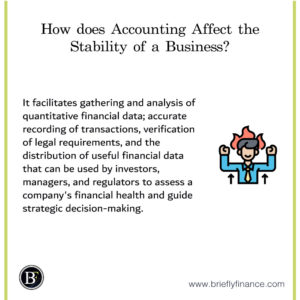An organization must account for every penny that comes in and goes out if it is to maintain steady expansion and long-term viability.
Accounting is critical to the stability of any business because it facilitates the gathering and analysis of quantitative financial data; accurate recording of financial transactions, verification of legal requirements, and the distribution of useful financial data that can be used by investors, managers, and regulators to assess a company’s financial health and guide strategic decision-making.
Without accurate accounting and bookkeeping, a company faces the danger of mishandling its funds and ultimately failing.

Attribution: The icons has been designed using resources from flaticon.com
Concerns Regarding Budget
If your company occasionally takes on new projects, you should always have a solid and well-defined budget in place for every single one. Without a rigorous financial plan, your company risks overspending on one project and could force you to reallocate resources set aside for another project.
A good budgeting approach, ideally based on the guidance of market experts and accountants, can help business owners avoid this situation. Furthermore, it is recommended that companies set aside money to cover unforeseen costs.
Without a rigorous financial plan, your company risks going over budget on some projects and having to reallocate resources from elsewhere.
Payroll Problems
Among a company’s many expenses, labor ranks high. In fact, many professionals in the field of entrepreneurship have found it beneficial to view employees as an advantage rather than a problem.
Payroll, is one of the many accounting areas with potential for error. To avoid underpaying or overpaying employees, it is important to precisely calculate wages and remunerations. In addition, paying your employees on time is important if you want to maintain their motivation and maximize their output. Payroll processing on time also ensures that taxes are paid on time to the federal and state governments, avoiding fines and fees.
Issues Concerning Taxation
It is the responsibility of every company to make timely tax payments. To begin with, penalties for late payments cut into your company’s bottom line. In addition, businesses must correctly calculate their tax obligations well in advance of the due dates to prevent either overpayment or underpayment of the tax.
While underpayment of taxes will result in fines and possible legal action against your company, the overpayment may result in a return. Unfortunately, taxation is a problem for many firms; it’s one of the most frequent causes of headaches for business owners.
Difficulties Along with Regulations
Rules and regulations differ from state to state, but effective accounting systems and processes are required to guarantee compliance with laws and regulations when it comes to your organization.
Financial statements must also be submitted to the company registrar by businesses. These must be submitted to stock exchanges and used in direct and indirect tax returns by publicly traded companies. Needless to say, accounting plays a key part in all these cases.
Bonus – Peace of mind
The stress and panic that can result from having disorganized books and pending tax deadlines go without saying. The last thing any business owner wants to deal with is overdue bookkeeping responsibilities.
Your books won’t be a source of anxiety when they’re completed and organized. Instead, you can relax knowing that this one aspect of your business is being handled professionally.
Final Thoughts
Accounting and bookkeeping are the backbone of any thriving company. They guarantee financial security, enable businesses in establishing and achieving their objectives, and ensure that tax payments are made on schedule.
Related Posts:
- 4 Reasons Why Accounting is Important in Everyday Life
- Is Accounting an Art or a Science?
- Is Accounting a Good Career | Everything you Need to Know
Disclaimer: Above links are affiliate links and at no additional cost to you. I may earn a commission. Know that I only recommend products, tools, services and learning resources I’ve personally used and believe are genuinely helpful and relevant. It is not because of the small commissions I make if you decide to purchase them. Most of all, I would never advocate for buying something that you can’t afford or that you’re not yet ready to implement.
